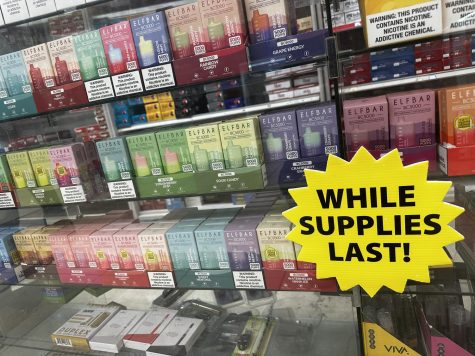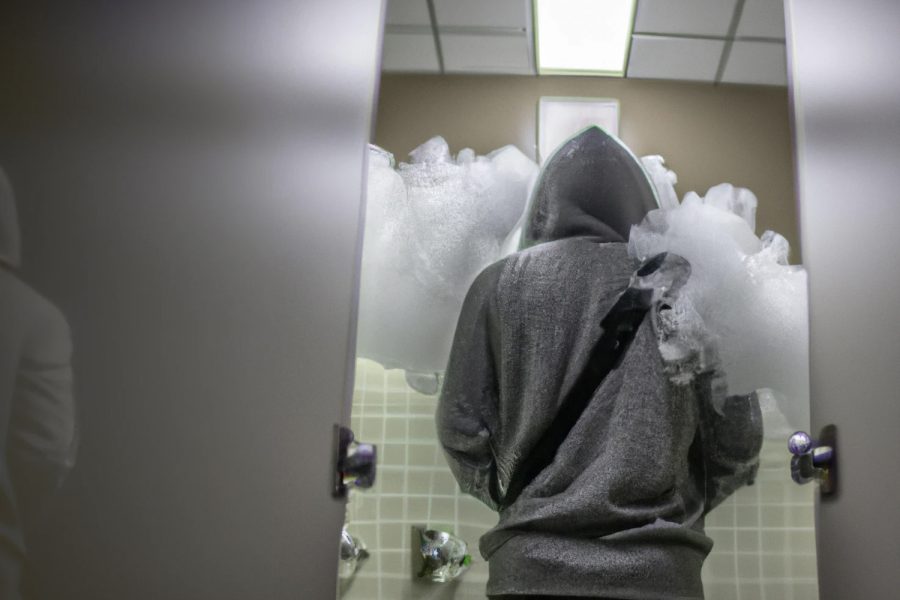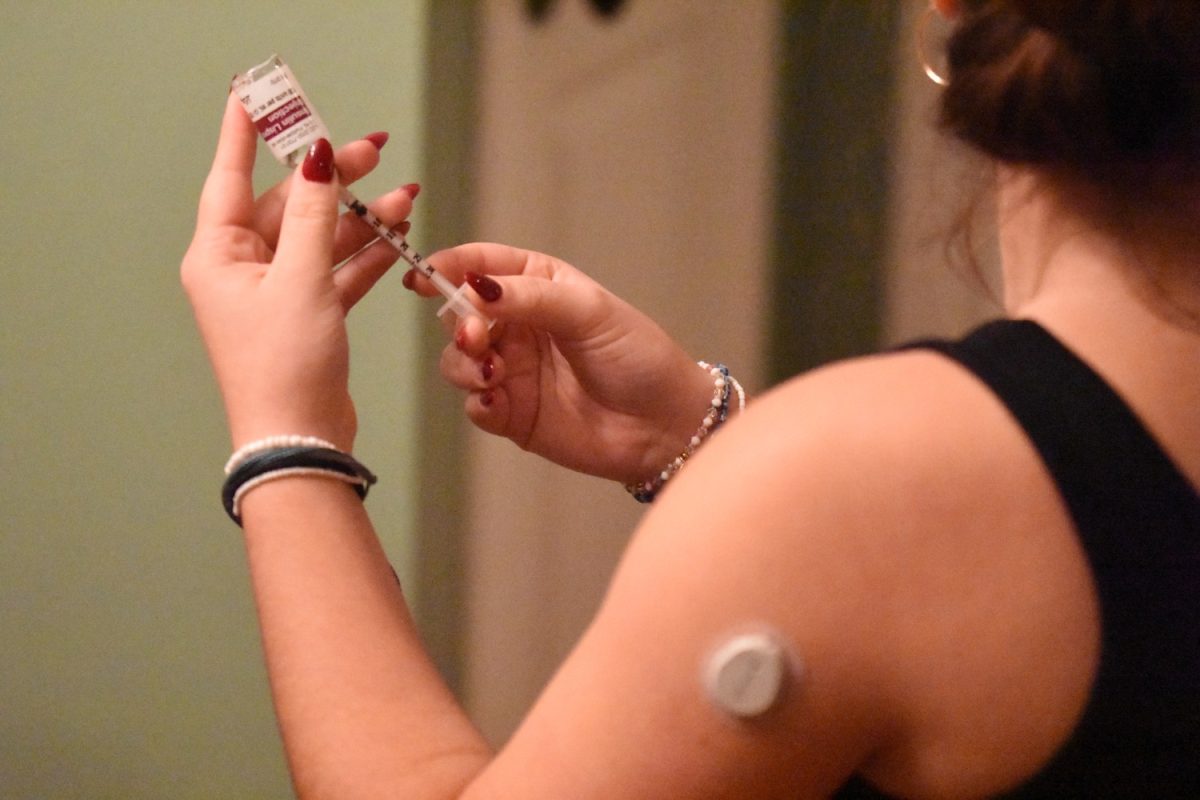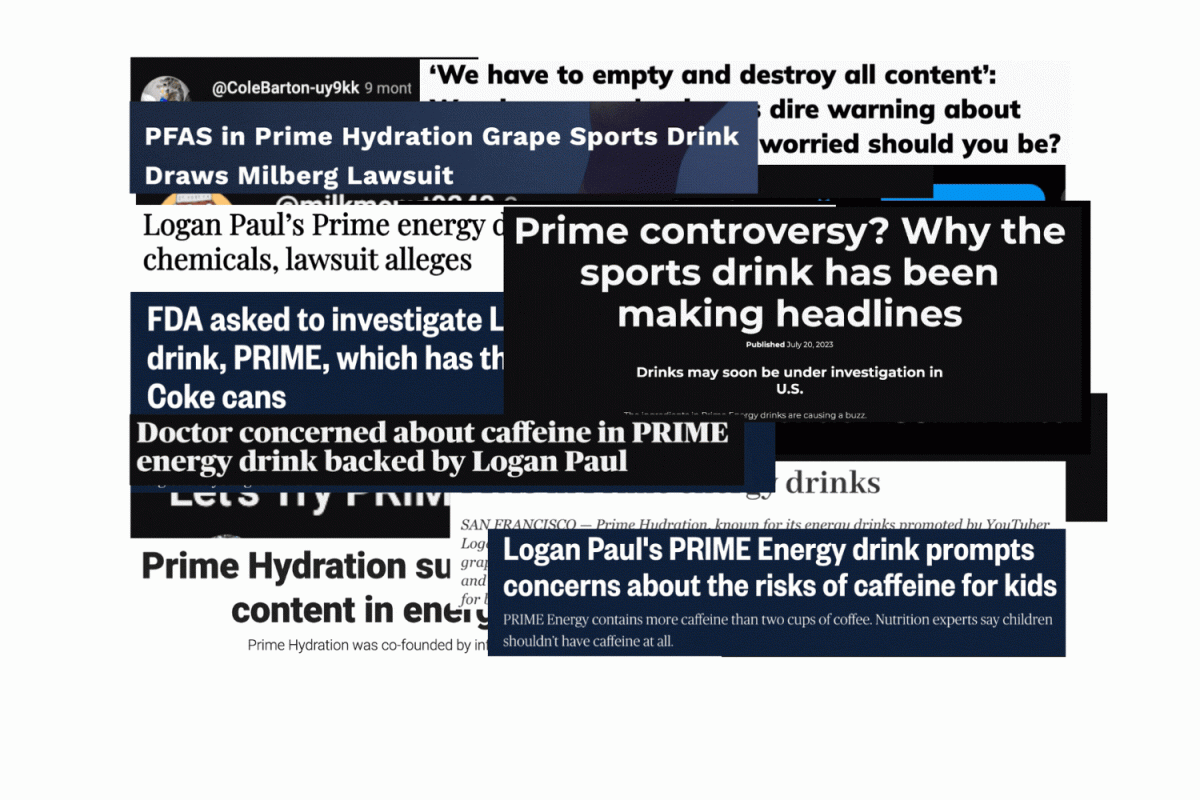Vapes and electronic cigarettes are taking over the lives of some students, leaving them huddled together in a minty haze between classes.
The substances they’re turning to for a solution are leaving them feeling unwell, and for some, struggling to quit.
Some students turn to vapes or other substances to socialize, rebel, or cope with stress. Self-medication is prevalent in adolescents due to poor mental health combined with external pressures like the pandemic and academic stress. In addition, drug dealers are using innovative social media marketing, making drugs that much easier to get a hold of.
“They’re escaping, self-medicating, or trying to take the edge off and relieve some stress,” said Ed Ternan, president and co-founder of Song For Charlie. This nonprofit group, which presented at Carlmont this year, spreads awareness about fentanyl in fake prescription pills.
Adolescent mental health is currently at a low point. The Centers for Disease Control (CDC) reports that suicide is the third leading cause of death for adolescents aged 12 to 19. Additionally, of children 3 to 17 years old, around 2.7 million have depression, and 5.8 million have anxiety.
Many teens turn to unhealthy coping mechanisms such as substance use. Licensed substance use disorder counselor Joe Gutierez explains that self-medication is a cycle. A substance can make you feel good in the short term, but it can also leave you chasing that artificially-induced good feeling in the long term.
“Someone will start with medicating with a substance and then feel better, then increase the consumption and become physiologically dependent upon that substance. So at some point, it stops being a choice,” Gutierez said.
When substance use stops being a choice, it can impact relationships and other aspects of one’s life. Ternan explains it in terms of independence.
“The goal of the people who sell drugs is to take your independence away from you, to make it so that you can’t wait to get to the bathroom to vape after class,” Ternan said.
Carlmont students aren’t immune to experimentation turning into a dependency. Some students are initially unworried about the effects of vaping.
“At first I did it for sh*ts and giggles, and then I slowly started to get addicted,” said Marie Langley* about her experience with vaping. Langley is a Carlmont student who was granted anonymity to protect her from any legal ramifications.
Langley started vaping just to experiment, but it eventually stopped being a choice.
The removal of choice and independence is a common consequence of substance use, which has become more dangerous in recent years, with synthetic opioids such as fentanyl being added to substances, which can include vape pens. Overdose deaths have significantly increased in the U.S. recently, and the trend has also occurred in California.
Vape and e-cigarette products have had a major impact on adolescents. While they were initially marketed as a smoking alternative for adults, they soon became a favorite of the youth. More than 2 million U.S. teens say they use e-cigarettes, and a quarter of them say they vape daily, according to a CDC study.
“Adolescents are the early adopters of lots of innovations,” Gutierez said.

The innovation of e-cigarettes and vapes appeal to adolescents, but their newness poses a potential risk in the future, as well as the risk of addiction in the short term.
“To me, it felt like a good experience, but then I realized that overall it just wasn’t good for me. So then I quit. And then I felt like something was being taken from me, so I went back,” Langley said.
The Carlmont administration is aware of how substance use affects students and works to offer support to students as opposed to punishment. Administrative Vice Principals Grant Steunenberg and Gregg Patner discussed how suspension is not a constructive punishment for students caught with substances. They said that keeping students away from school isn’t going to solve the problem.
“If you get caught with a substance, it used to be an automatic three-day suspension. The second time, a five-day suspension. Thank goodness we don’t do that anymore,” Steunenberg said.
Steunenberg and Patner recommend that students reach out to their school counselor if they use substances often. However, if that feels like too big a step, there are other resources available in your back pocket.
For example, the Substance Abuse and Mental Health Services Administration has a free helpline (1-800-662-4357) that can also refer you to relevant resources. If a phone call feels too stressful, there’s also the Crisis Text Line (text “HOME” to 741741). Those over the age of 14 can also seek out counseling independently. Taking small steps to reach out can improve one’s mental health.
Gutierez recommends exercise as a healthy way to release stress. Exercise has been shown to improve mood, mental health, and physical health, regardless of addiction or substance dependency.
“I’ve been doing weight training at Carlmont for two years and it’s a really great break from all the academics. It’s just a complete stress relief. I’m a lot more relaxed and energetic afterward,” said Ava Gaboury, a Carlmont junior.
Gaboury explains that exercise relieves stress and provides a positive break between classes. It’s a healthy habit to build into one’s routine. Gaboury doesn’t use substances, but exercise can also be a healthy alternative to substance use.
Langley also recommends adopting a different, healthier habit to replace vaping or substance use, particularly when trying to quit.
“Trying to quit was difficult at first, but then slowly it got better and better. I found new habits like chewing gum that really did help me. It gave me that sensation of something minty in my mouth and some sort of flavor at all times,” Langley said.
While there are a lot of methods that experts recommend to stop using substances, the approach of the Carlmont administration is to focus on why a student is using substances. The theory is that minimizing push factors can lessen the motivation to use substances.
“If there is a student with a recurring substance issue, we will work with them to help address the why,” Patner said.
Gutierez said that experimentation in high school is normal but that having all the information at your disposal is essential to make educated decisions.
“There’s no shame in asking for help,” Gutierez said.
However, Langley warns against experimentation altogether, citing the uncomfortable physical side effects.
“Just don’t do it. It’s just not worth it. You get headaches. Your stomach starts to hurt. You feel like you’re going to throw up. It’s just not worth it,” Langley said.






















